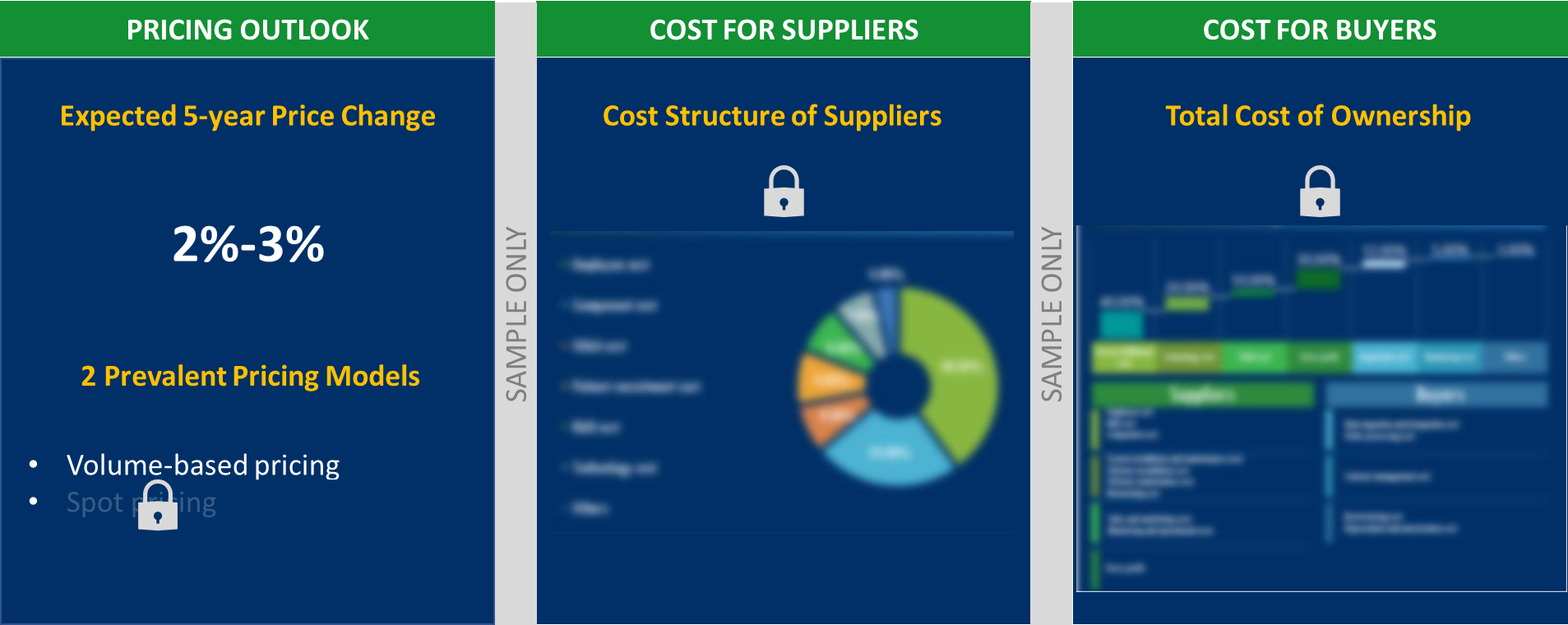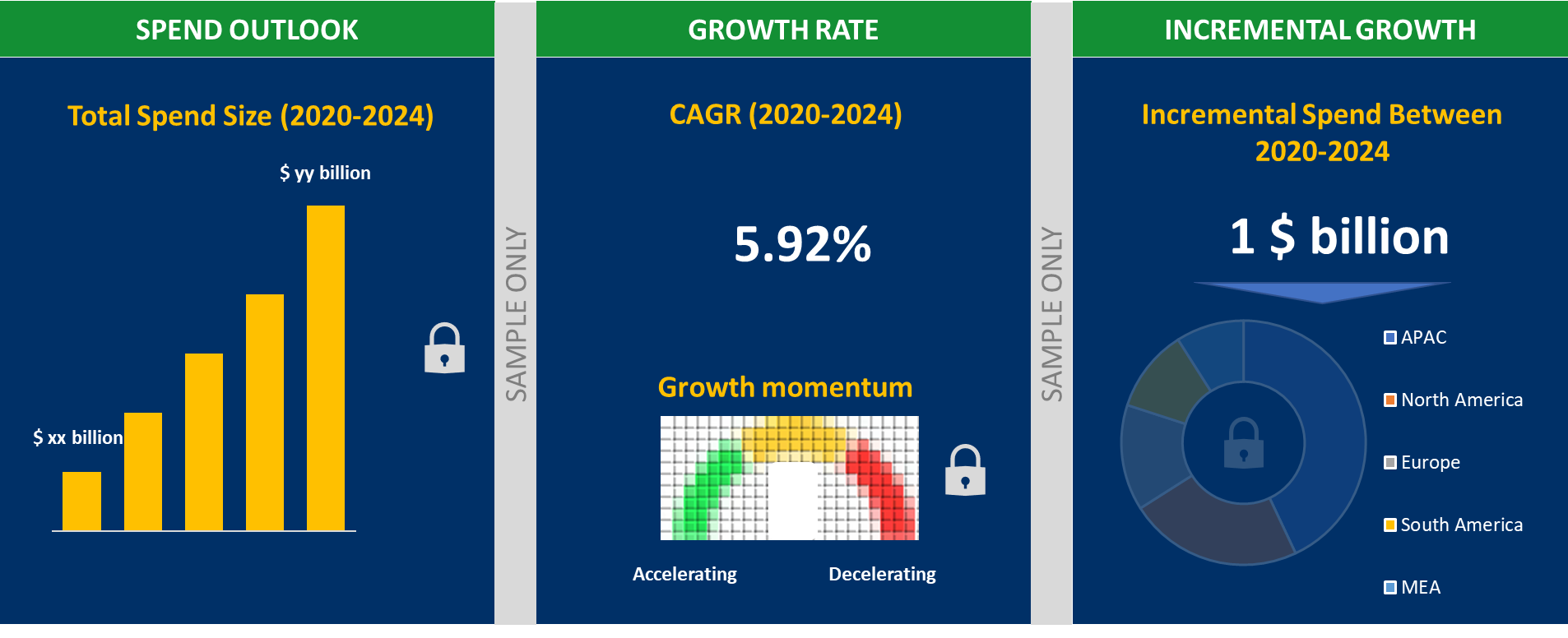IoT Analytics - Procurement Market Intelligence Report
| Published: May 2020 | Pages: 120 | SKU: IRCMSTR21513 |
The report identifies Oracle Corp., Microsoft Corp., and International Business Machines Corp. among the most important suppliers for IoT analytics procurement. Suppliers have moderate bargaining power in a market that is set to grow at 6.40%. Therefore the price of IoT analytics will increase by 2%-4% during the forecast period.
Several strategic and tactical negotiation levers are explained in the report to help buyers achieve the best prices for IoT analytics. The report also aids buyers with relevant IoT analytics pricing levels, pros, and cons of prevalent pricing models such as perpetual license, subscription-based pricing, and package pricing, and category management strategies and best practices to fulfill their category objectives.
IoT Analytics Procurement: Strategies and Category Management
A targeted strategic approach to IoT analytics sourcing can unlock several opportunities for buyers. Still, we see that buyers have a pre-dominantly transaction-based approach towards the category and miss out on cost-saving opportunities in the absence of actionable intelligence on IoT analytics procurement market.
Strategic Sourcing and Enablers

During our interactions with category managers, it is often cited that buyers have moderate bargaining power in the IoT analytics market. Our sourcing experts believe that a holistic category management approach can help buyers further maximize the value on their IoT analytics procurement. The report explains key category management objectives that should form the base for IoT analytics sourcing strategy, including:
- Supply assurance
- Cost savings
- Adherence to regulatory nuances
- Scalability of inputs
- Reduction of TCO
- Category innovations
- Top-line growth
- Minimalization of ad hoc purchases
- Green initiatives
- Supply base rationalization
- Demand forecasting and governance
In addition to identifying the strategic goals and initiatives for the category management, it is also important to create the necessary support structure to facilitate their implementation. The report identifies multiple enablers that can help maximize the efficiency of IoT analytics category management.
This report provides in-depth inputs on streamlining your IoT analytics category management practices. Request for a FREE sample for detailed answers on:
- What should be my strategic sourcing objectives, activities, and enablers for IoT analytics category?
- Which negotiation levers can I pull for cost-saving?
- What are IoT analytics procurement best practices I should be promoting in my supply chain
IoT Analytics Procurement: Top Suppliers
Leading global suppliers can assist buyers in realizing high-cost savings through their efforts on areas such as vertical integration, supplier synergies, reducing total ownership cost, negotiate on pricing and contractual terms, level of automation, conference participation, ad-hoc spend management, managing commodity price volatility, and reducing inventory shrinkage. By collaborating with global suppliers, buyers can easily implement cost-saving and assure themselves of high-quality procurement of IoT analytics during diverse situations.
Key Suppliers and Supplier Management

This report offers key advisory and intelligence to help buyers identify and shortlist the most suitable suppliers for their IoT analytics requirements. Some of the leading IoT analytics suppliers profiled extensively in this report include:
- Oracle Corp.
- Microsoft Corp.
- International Business Machines Corp.
- SAP SE
- Alphabet Inc.
- CISCO SYSTEMS Inc.
- Dell Technologies Inc.
- Amazon.com, Inc.
- Hitachi Ltd.
- salesforce.com Inc.
Industry expertise, depth of solutions, implementation and support services, and support for multiple data sources are some of the most critical parameters that buyers use to shortlist the suppliers in IoT analytics. Shortlisted suppliers must be carefully evaluated and scrutinized against business needs, technical specifications, operational requirements, security compliance, regulatory mandates, legal requirements, quality control, change management procedures, pricing models, penalty clauses, SLA nuances, acceptance criteria, and evaluation criteria and several other selection criteria described in detail by this report.
Request for a FREE sample for a complete understanding of IoT analytics supplier landscape:
- Am I engaging with the right suppliers?
- Which KPIs should I use to evaluate my incumbent suppliers?
- Which supplier selection criteria are relevant for IoT analytics?
- What are the IoT analytics category essentials in terms of SLAs and RFx?
IoT Analytics Procurement: Pricing Insights
Suppliers in this market have moderate bargaining power owing to low pressure from substitutes and a moderate level of threat from new entrants. Therefore, it is extremely important to get the pricing and pricing model right. Buyers can benchmark their preferred pricing models for IoT analytics with the wider industry and identify the cost-saving potential.
For example, perpetual license, subscription-based pricing, and package pricing are the most widely adopted pricing models in IoT analytics. Each pricing model offers optimum benefits and fitment in specific situations. Buyers are advised to identify the model that suits their operations in the best manner and link supplier performance to the pricing models.
Price Strategies and Benchmark

Additionally, it is crucial to keep track of current and future IoT analytics price trends to completely optimize the value of the purchase, both from current cash outflow as well as overall cost and benefit perspective. The IoT analytics report expects a change of 2%-4% during the forecast period. Price forecasts are beneficial in purchase planning, especially when supplemented by constant monitoring of price influencing factors described in the report.
Pricing insights presented in this report cover pricing benchmarks and the trends and strategies that can help optimize cost savings. Request for a FREE sample to access the definite purchasing guide on the IoT analytics that answers all your key questions on price trends and analysis:
- Am I paying/getting the right prices? Is my IoT analytics TCO (total cost of ownership) favorable?
- How is the price forecast expected to change? What is driving the current and future price changes?
- Which pricing models offer the most rewarding opportunities?
IoT Analytics Procurement: Spend Growth Analysis
The report provides a complete drill-down on global ioT analytics spend outlook at a global as well as regional level. Current spend scenario, growth outlook, incremental spend, and other key information is available individually for North America, South America, Europe, Middle East and Africa, and APAC.
Spend Growth and Demand Segmentation

The IoT analytics market will register an incremental spend of about $ 4 billion, growing at a CAGR of 6.40% during the five-year forecast period. Only a handful of regions will drive the majority of this growth. On the supply side, North America, South America, Europe, Middle East and Africa, and APAC will have the maximum influence owing to the supplier base.
The drivers and inhibitors that influence these global and regional outlooks are also elaborated in detail. Request for a FREE sample to access our in-depth growth decomposition analysis:
- Is this growth cyclical?
- When will the growth curve peak?
- What is driving the growth (or lack of it) in individual geographies?
- Which geographies hold the most rewarding opportunities for buyers and suppliers?
Executive Summary
Market Insights
Category Pricing Insights
Cost-saving Opportunities
Best Practices
Category Ecosystem
Category Management Strategy
Category Management Enablers
Suppliers Selection
Suppliers under Coverage
US Market Insights
Category scope
Appendix
Research Framework
SpendEdge presents a detailed picture of the market by way of study, synthesis, and summation of data from multiple sources. The analysts have presented the various facets of the market with a particular focus on identifying the key category influencers. The data thus presented is comprehensive, reliable, and the result of extensive research, both primary and secondary.
INFORMATION SOURCES
Primary sources
- Procurement heads
- Category managers
- Sourcing consortium professionals
- Procurement managers
- Category heads of suppliers
- Client account heads/managers
- Client and industry consultants
Secondary sources
- Industry journals and periodicals
- Periodicals and new articles
- Category webinars
- Industry and government websites on regulations and compliance
- Internal databases
- Industry blogs/thought leader briefings
DATA ANALYSIS

PURCHASE FULL REPORT OF
IoT Analytics - Procurement Market Intelligence Report